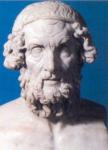Homer and War
 The following is a response to an article trying to enlist the poet Homer on the side of hawks by the Boston Globe’s resident neocon right winger Jeff Jacoby. This letter was not published.
The following is a response to an article trying to enlist the poet Homer on the side of hawks by the Boston Globe’s resident neocon right winger Jeff Jacoby. This letter was not published.
Dear Editor:
Once again Jeff Jacoby flaunts his ignorance, this time on Greek poet Homer (“The Radical Dream of Peace on Earth,” Globe, 12-25-13).
Failing to grasp Homer’s irony, Jacoby cites Hektor’s militaristic advice to his child—this just moments before Hektor goes to his ignominious death.
Of course The Iliad portrays men in mortal combat as they endure conflicts of courage and cowardice, of patriotism and family devotion, of friendship and betrayal. But how does it portray them? At the height of his aristeia (string of victories), Achilleus, Homer tells us, “was straining to win glory, his invincible hands spattered with bloody filth.” (Book 20) Achilleus, every Greek knew, had chosen a short glorious life over a long infamous one. And this battlefield glory was spattered with bloody filth—hardly a glorification of war.
No, The Iliad does not glorify macho militarism—and I write as a WW2 veteran (88th Infantry Div., Italy). It shows us men caught in a war without meaning; again and again they try to end it, but they cannot—mostly because of their own irrationality. In her brilliant essay “The Iliad or the Poem of Force,” Simone Weil, writing in 1940-41, the darkest days of World War II, shows that in The Iliad force turns humans into things, that it destroys everyone, that all the victors become victims:
“Force is as pitiless to the man who possesses it, or thinks he does, as it
is to its victims: the second it crushes, the first it intoxicates. The truth
is, nobody really possesses it…. In this poem there is not a single man
who does not at one time or another have to bow his neck to force.”
In my view, The Iliad ranks among the most powerful anti-war masterpieces, but due to poor teaching and/or careless reading, it has come to represent the opposite.
Marvin Mandell